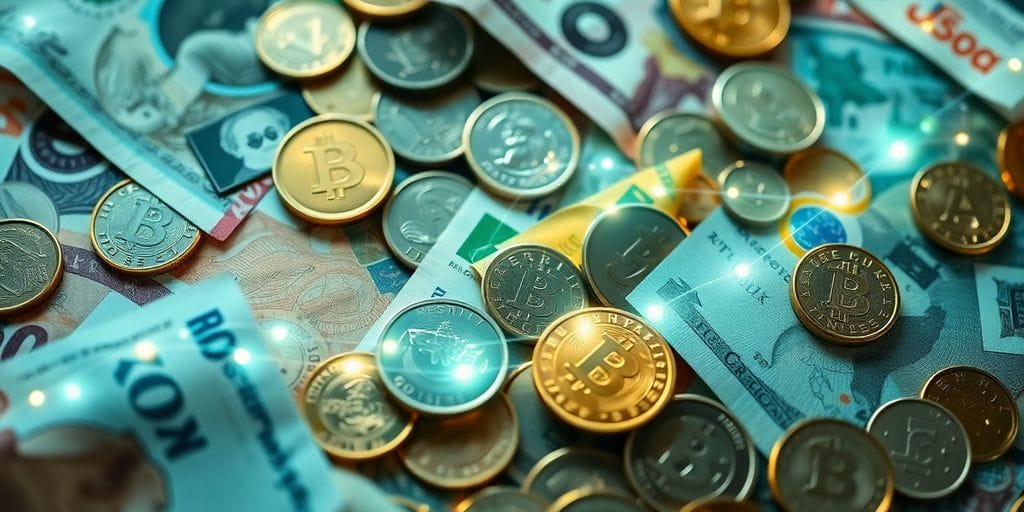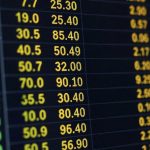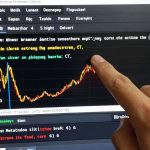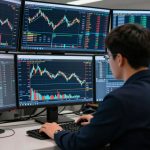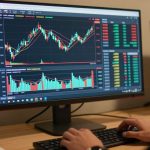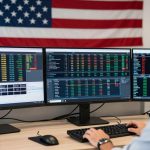Want to get better at trading? A forex economic calendar is a really useful tool for anyone in the currency market. It helps you keep track of big economic events that can make currency prices move. This guide will show you how to use a forex economic calendar to make smarter trading choices and avoid surprises.
Key Takeaways
- A forex economic calendar is a schedule of important economic news and reports that can affect currency prices.
- Checking the forex economic calendar helps traders know when big market moves might happen.
- You can use the calendar to see how strong an event’s impact might be on the market.
- The forex economic calendar helps traders make quick decisions and plan their trades better.
- Many official sources provide reliable forex economic calendar data, like central banks and government financial groups.
Understanding the Forex Economic Calendar
What is a Forex Economic Calendar?
Okay, so what is this thing we keep talking about? A forex calendar is basically your go-to schedule for all the important economic announcements and events that can move the currency markets. Think of it as a heads-up display, telling you when key data like GDP, employment figures, or central bank decisions are coming out. It’s not just for the big stuff either; it includes a range of indicators that can give you clues about the health of different economies.
- Tracks scheduled economic events.
- Includes economic metrics and financial reports.
- Helps traders manage risks.
It’s a tool that helps you stay informed and prepared, so you’re not caught off guard by sudden market swings.
Why is Economic Calendar Analysis Important?
Why bother with all this calendar stuff? Well, economic calendar analysis helps you anticipate market volatility. These events often cause big price swings, and knowing when they’re happening lets you adjust your trading strategies accordingly. It’s like knowing when a storm is coming – you can prepare your ship, or in this case, your portfolio.
- Anticipate market volatility.
- Adjust trading strategies.
- Understand market movements.
Key Components of Forex Economic Calendar Analysis
Alright, let’s break down what you’ll actually see on one of these calendars. You’ll usually find the date and time of the event, a description of what it is (like a GDP release or an interest rate decision), the currency it’s likely to affect, and an impact level (high, medium, or low). Some calendars also show previous data, forecasts, and actual results after the event happens. This lets you compare expectations with reality and see how the market reacted. It’s all about having the right information at your fingertips.
| Component | Description
How to Effectively Read a Forex Economic Calendar

Checking the Date and Time
Okay, so first things first, you gotta make sure your economic calendar is showing the right time. I mean, seriously, this is super important. You need to adjust the calendar to your local time zone. Imagine reacting to news an hour late – that’s a recipe for disaster. Most calendars let you set your time zone in the settings, so take a sec to do that before you even look at anything else. It’s like setting your watch before a big meeting – basic stuff, but crucial.
Identifying the Impact Level
Next up, you’ll see indicators that show how much an event might shake things up. Usually, they’re marked as low, medium, or high impact. Think of it like a weather forecast: low impact is a drizzle, medium is a thunderstorm, and high impact is a full-blown hurricane. High-impact events are the ones you really need to watch because they can cause some pretty big swings in the market. Some calendars use symbols, like bulls, to show the impact level. One bull might mean low impact, while three bulls mean high impact. Pay attention to these indicators; they’re there to help you prioritize which announcements to focus on. Understanding market movements is key.
Understanding the Event Details
Alright, so you’ve got the date, time, and impact level sorted. Now it’s time to dig into what the event actually is. The calendar will usually give you a brief description, like "GDP Growth Rate" or "Interest Rate Decision." If you’re not sure what an event means, Google it! Seriously, there’s no shame in looking things up. You’ll also want to pay attention to the "actual," "forecast," and "previous" numbers. The "actual" is what just got released, the "forecast" is what analysts were expecting, and the "previous" is what happened last time. Comparing these numbers can give you a sense of whether the news is good or bad, and how the market might react. For example, if the actual GDP growth is way higher than the forecast, that’s generally good news for the currency.
It’s easy to get overwhelmed by all the data on an economic calendar, but don’t let it intimidate you. Start by focusing on the high-impact events and the currencies you’re trading. Over time, you’ll get a better feel for which events matter most to you and how the market tends to react.
Here’s a simple table to illustrate:
| Event | Actual | Forecast | Previous |
|---|---|---|---|
| GDP Growth Rate | 2.5% | 2.0% | 1.8% |
| Interest Rate Decision | 0.50% | 0.25% | 0.25% |
| Unemployment Rate | 4.0% | 4.2% | 4.5% |
Remember to:
- Check the calendar daily.
- Understand the event details.
- Compare actual vs. forecast vs. previous numbers.
Leveraging the Forex Economic Calendar for Trading Decisions
The Forex economic calendar isn’t just a list of dates; it’s a strategic tool that can significantly influence your trading outcomes. It allows traders to anticipate market movements and adjust their tactics accordingly. By incorporating this calendar into your routine, you can stay informed about economic announcements, manage risks, and potentially profit from market events.
Real-Time Decision-Making
The ability to act quickly when economic data is released is important. A constantly updated calendar allows traders to respond immediately to breaking news, capitalizing on sudden price changes. For example, if the calendar shows an unexpected drop in unemployment figures, you might quickly decide to buy a currency based on the expectation of a strengthening economy. This kind of real-time analysis can be the difference between a profitable trade and a missed opportunity.
- Reacting to breaking news.
- Capitalizing on price surges.
- Avoiding high slippage periods.
Anticipating Market Volatility
Economic announcements often trigger volatility in the Forex market. The calendar helps you anticipate these periods, allowing you to adjust your trading strategy accordingly. For instance, knowing that a major central bank is about to announce its interest rate decision allows you to prepare for potential market swings. You might tighten your stop-loss orders, reduce your position size, or even choose to sit on the sidelines until the market stabilizes. Understanding which currencies are likely to be impacted by a particular event is also important. For example, a Federal Reserve interest rate decision will primarily affect USD pairs.
Informing Trading Strategies
The economic calendar can inform various trading strategies. Here’s how:
- Trend Following: Use the calendar to identify potential trend reversals or continuations based on economic data releases.
- Breakout Trading: Look for opportunities to trade breakouts that occur after major economic announcements.
- Carry Trade Adjustments: Monitor interest rate decisions to adjust your carry trade positions.
The economic calendar is more than just a schedule; it’s a window into the factors that drive currency valuations. By understanding the relationships between economic events and market movements, traders can develop more informed and effective trading strategies.
Insights Provided by the Forex Economic Calendar
Scheduled Events and Releases
The forex economic calendar is more than just a list of dates; it’s a window into the financial world’s agenda. It provides a schedule of upcoming economic events and releases, like GDP reports, inflation data, and employment figures. These events can cause big market movements, so knowing when they’re happening is important. The calendar also specifies the type of event, whether it’s a report release, an economic indicator update, or a central bank decision. This helps traders predict how the market might react. For example, a monthly employment report can give insights into the strength of a country’s economy, potentially affecting its currency value. Traders can use this information to adjust their trading methods accordingly.
Historical Context and Data
Beyond just showing what’s coming up, a good economic calendar also gives you access to past data. This historical context is super useful. You can see how the market reacted to similar events in the past, which can help you make better predictions about future movements. It’s not just about knowing the numbers; it’s about understanding the story behind them. For instance, if you’re looking at the latest inflation data, you can compare it to previous releases to see if inflation is trending up or down. This can inform your decisions about whether to buy or sell a currency. Understanding how various economic patterns and financial reports impact currency markets is key.
Customization Options and Alerts
One of the best things about modern forex economic calendars is that you can customize them to fit your needs. You can filter events based on their importance, the countries they affect, and the type of data being released. This means you can focus on the information that matters most to you. Plus, many calendars let you set up alerts, so you’ll never miss an important announcement. This is especially helpful if you’re trading currencies from different time zones. You can set alerts for market volatility and upcoming financial events.
The ability to tailor the calendar to your specific trading style and risk tolerance is a game-changer. It allows you to stay informed without being overwhelmed by irrelevant information. This focused approach can lead to more confident and profitable trading decisions.
Here’s a simple example of how you might customize your calendar:
- Impact Level: Filter for medium and high-impact events only.
- Regions: Select the countries whose currencies you trade (e.g., USD, EUR, JPY).
- Event Types: Focus on events like interest rate decisions, GDP releases, and employment reports.
The Forex Economic Calendar as an Educational Tool
The Forex economic calendar isn’t just for seasoned pros. It’s a fantastic resource for anyone trying to learn more about how the market works. Think of it as a syllabus for understanding the global economy’s impact on currency values. It’s a way to connect real-world events with market movements, which is super helpful when you’re starting out.
Understanding Event-Market Relationships
One of the best things about using an economic calendar is that it helps you see how different events affect the market. For example, you can track historical data charts and see how a surprise interest rate hike by a central bank impacts a currency’s value. Over time, you start to recognize patterns and develop a better sense of what to expect when certain announcements are made. It’s like learning a new language – the more you practice, the better you get at understanding the nuances.
Developing Disciplined Trading Habits
Using the economic calendar can also help you develop better trading habits. Instead of just jumping into trades based on gut feelings, you start planning ahead. You check the calendar, identify important events, and think about how those events might affect your positions. This kind of preparation is key to becoming a successful trader.
Here’s how the calendar can help:
- Planning: Review the calendar each morning to see what’s coming up.
- Research: Look into the potential impact of each event.
- Patience: Wait for the data to be released before making big decisions.
The economic calendar encourages a more thoughtful and less reactive approach to trading. It helps you avoid impulsive decisions and focus on making informed choices based on available information.
Enhancing Risk Management
Finally, the economic calendar can help you manage risk more effectively. By knowing when major announcements are scheduled, you can avoid trading during periods of high volatility or adjust your positions accordingly. This can help you protect your capital and avoid costly mistakes. It’s all about being prepared and understanding the potential risks involved in each trade. For example, you can use the calendar to align your trading methods with the release of high-impact data.
Integrating the Forex Economic Calendar into Your Routine
Aligning Trading Operations with Data Releases
Okay, so you’ve got this economic calendar, right? Now what? It’s not just about knowing when stuff happens, but how to actually use that info in your day-to-day trading. The key is to align your trading operations with the scheduled data releases. Think of it like this: you wouldn’t start a road trip without checking the weather forecast, would you? Same deal here.
- Plan your trading day around major announcements.
- Adjust your risk tolerance based on the expected volatility.
- Have a clear strategy for how you’ll react to different outcomes.
Staying Ahead of Economic Announcements
It’s not enough to just glance at the calendar the morning of. You need to be proactive. I like to spend some time each weekend reviewing the week ahead. What are the big events? What are the potential surprises? What are the annual budget expectations? This way, you’re not caught off guard. You’re prepared. You’re ready to roll.
- Set up alerts for key releases.
- Follow financial news outlets.
- Analyze past data to anticipate future trends.
It’s easy to get lazy and skip this step, but trust me, it makes a huge difference. Taking the time to prepare will save you from making rash decisions later on.
Exploiting Trading Opportunities
Okay, so you’ve done your homework. You know what’s coming. Now it’s time to actually make some money! The economic calendar isn’t just about avoiding risk; it’s about finding opportunities. Look for situations where the market is likely to overreact to a particular announcement. Maybe the consensus is way off, or maybe the market is already pricing in a certain outcome. These are the times when you can really capitalize. Keep an eye on market volatility.
- Identify potential overreactions.
- Use limit orders to enter positions at favorable prices.
- Manage your risk carefully to protect your profits.
Here’s a simple example:
| Event | Expected Result | Actual Result | Potential Action |
|---|---|---|---|
| GDP Release | 0.5% | 1.0% | Buy currency due to stronger-than-expected growth |
| Inflation Data | 2.0% | 1.5% | Sell currency due to weaker-than-expected inflation |
| Employment | 150k new jobs | 200k new jobs | Buy currency due to positive employment figures |
Official Sources for Forex Economic Calendar Data

Reputable Economic Calendar Providers
When you’re trying to figure out what’s moving the market, a good economic calendar is super important. There are a bunch of places to find them, and some are definitely better than others. You want to look for providers that are known for being fast and correct. Think about it like this: if the calendar is slow or has wrong info, you could miss out on chances or make bad calls.
- Check out a few different calendars to see which one you like best.
- Make sure they cover all the countries and events you care about.
- See if they have features like alerts and customization.
Central Bank Communications
Don’t just rely on economic calendars. Go straight to the source! Central banks, like the Federal Reserve, the European Central Bank, and the Bank of Japan, are big players in the forex world. Their announcements and statements can cause major market moves.
It’s a smart move to keep an eye on what these banks are saying. Read their official releases, listen to their speeches, and follow their policy updates. This gives you a better sense of what they’re thinking and how they might act, which can help you make smarter trades.
Governmental Financial Bodies
Besides central banks, keep tabs on what government financial bodies are doing. These include agencies that release important economic data, like GDP figures, employment numbers, and inflation rates. This data can really shake things up in the forex market.
Here’s why it matters:
- Data Accuracy: Government agencies are usually the original source, so their numbers are the most reliable.
- Timeliness: They often have release schedules, so you know when to expect the info.
- Market Impact: Traders watch these releases closely, and the market can react fast to any surprises.
Conclusion
So, that’s the rundown on using the Forex economic calendar. It’s a pretty simple tool, but it can make a big difference in how you trade. Keeping an eye on those economic announcements helps you get ready for market changes and manage your risks better. Whether you’re just starting out or you’ve been trading for a while, this calendar is a good thing to have in your corner. It just helps you make smarter choices, and that can really help your trading do well.
Frequently Asked Questions
What is a Forex economic calendar?
An economic calendar for Forex is like a special planner that shows all the important money news and events that might make currency prices change. It tells you when these events will happen, what they are about, and how much they might shake up the market.
Why is using an economic calendar important?
It’s super important! This calendar helps traders guess when prices might jump or drop a lot. By knowing what’s coming, traders can make smarter choices, avoid big risks, and try to make more money.
How do I read an economic calendar?
You need to look at the date and time to make sure it matches where you are. Then, check how big of an impact each event is expected to have – some events are like a tiny ripple, while others are like a huge wave. Finally, understand what each event means, like if it’s about jobs, prices, or interest rates.
Can I set alarms for events on the economic calendar?
Yes, many calendars let you set up alerts! This means you can get a reminder on your phone or computer right before an important event happens, so you don’t miss out on big market moves.
Where can I find a good economic calendar?
You can find reliable economic calendars from big financial news websites, trading platforms, and even directly from central banks or government money groups. Always pick a source that updates quickly and is known for being accurate.
How does the economic calendar help me learn about trading?
It helps you learn how different news stories affect currency prices. By watching the calendar, you can see patterns and understand why the market acts the way it does. It also helps you get into a good habit of planning your trades carefully.
